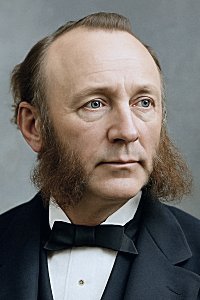Introduction

Born: January 25, 1835, Florida, New York.
Died: August 30, 1902, at the home of his daughter, Mrs. Thomas G. Bolles, in Orange, New Jersey.
Buried: Rosedale Cemetery, Orange, New Jersey.

Born: January 25, 1835, Florida, New York.
Died: August 30, 1902, at the home of his daughter, Mrs. Thomas G. Bolles, in Orange, New Jersey.
Buried: Rosedale Cemetery, Orange, New Jersey.
Seward came from a distinguished family (William H. Seward, Secretary of State to American president Abraham Lincoln, was his second cousin).
Theodore attended the Normal Musical Institute at North Reading, Massachusetts, where he studied with Lowell Mason, George Root, and Thomas Hastings.
He then became a professor at the Teachers’ College in New York (later merged into Columbia University).
He lived in Rochester, New York (where he married Mary Coggeshall in 1860), then moved to Orange, New Jersey, in 1868.
He was supervisor of music in the public schools of Orange and surrounding cities, and organist and musical director in several churches. He achieved national fame as a composer, teacher, editor of music periodicals, and author of educational works.
Among Seward’s efforts was collecting African-American spirituals, more than a hundred of which were published in Jubilee Songs (New York: Biglow & Main), in connection with the Fisk Jubilee Singers, who raised several hundred thousand dollars by their concerts in America and Europe for their university at Nashville, Tennessee. Seward was the group’s musical director and voice trainer during their second European tour.
Seward organized the Brotherhood of Christian Unity (1891), the Don’t Worry Club (1897), and the Golden Rule Brotherhood (1901).
He traveled extensively throughout Europe and America. While at the Crystal Palace in London during Queen Victoria’s Golden Jubilee, he was called upon to lead the singing of God Save the Queen.
He edited The New York Musical Pioneer (1864), The New York Musical Gazette (1867–73), The Tonic Sol-fa Advocate (1881–85), and Musical Reform (1886–88).